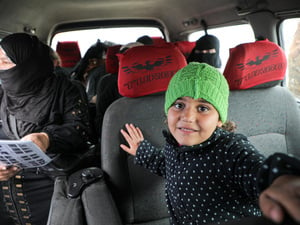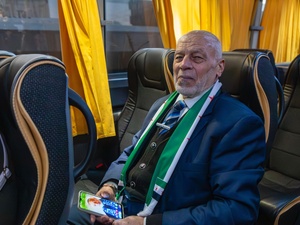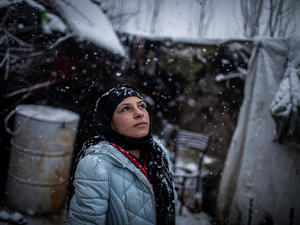Jordan opens a new desert camp for Syrian refugees at Azraq
Jordan opens a new desert camp for Syrian refugees at Azraq

Abu Saleh and his family survey their new surroundings in Azraq refugee camp.
AZRAQ CAMP, Jordan, April 30 (UNHCR) - After a dangerous 1,000-kilometre journey to escape the violence in Syria, Abu Saleh and his family made the night-time crossing into neighbouring Jordan not knowing where they would end up.
Two days after fleeing their home, they are among the first group of 230 Syrian refugees to arrive at the newly opened Azraq camp, located in the desert 100 kilometres east of the Jordanian capital, Amman.
Azraq, which formally opened today, will be run by the Jordanian authorities with the support of UNHCR and its humanitarian partners. The camp was opened to relieve pressure on the Za'atri camp, some 80 kilometres to the north-west. With around 100,000 residents, Za'atri is one of the world's largest refugee camps and is running out of space.
There are currently nearly 5,000 shelters in Azraq, capable of housing up to 25,000 refugees. Their zinc and steel construction is designed to better cope with the high winds and extremes of temperature in Jordan's eastern desert compared with the tents and caravans found in Za'atri.
Abu Saleh and his family have moved into one of the shelters. The 47-year-old was a farmer in the northern Syrian province of Al-Hassakeh, but two years without water or electricity left him unable to produce enough to feed his wife and their four daughters and three sons, aged from 18 months to 21 years.
As fighting surrounded their village, Abu Saleh says he felt compelled to leave Syria and seek refuge abroad. He paid about 500,000 Syrian pounds (almost US$3,400) to transport his family by road from Al-Hassakeh to within six kilometres of the Jordanian border.
The 48-hour journey took them through several areas of conflict, forcing them to get out and walk. "We heard that 28 people were killed on their way to Jordan two days before we left, so we were very anxious," Abu Saleh tells UNHCR. "Several times we had to get out of the cars and spread out on foot to avoid the risk that a bomb would kill my entire family."
Once they made it over the border, the Jordanian authorities brought them to a registration centre together with dozens of other refugee families. There they learnt that they would be among the first residents of the camp at Azraq.
Sitting cross-legged on the floor of their six-by-four metre shelter inside the new camp, his wife Um Saleh describes her mixed emotions. "We left everything behind. Leaving your home is a hard emotional decision for everyone," she says. "But we're happy to be here and I'm glad that my family is safe."
The rows of white shelters spreading out across the desert are arranged into smaller groups of 12, each group with its own bathrooms and latrines. The idea is to enable extended families and acquaintances to live close together, providing greater protection and an increased sense of community.
As the first refugees are taken by pickup truck with their belongings to their shelters, they pass rows of half-built frames of shelters under construction. Ultimately, the 15-square-kilometre Azraq site will have the capacity to host up to 130,000 residents.
While the new camp will help manage the inflow of refugees from Syria - now averaging 600 per day - it also underscores the protracted nature of the humanitarian crisis there, says Bernadette Castel-Hollingsworth, head of UNHCR's Azraq field office.
"The camp is a testimony to the continuous deterioration of the situation in Syria, but also to the continuous commitment of the Jordanian authorities and the Jordanian people to receive refugees here," she says. Conditions will not be easy for the refugees living there, but she hopes that they will quickly make the camp their own and adapt to their new environment.
For now the new residents at Azraq are happy to have made it somewhere safe, but uncertain about what the future holds. Abu Ahmed, 46, fled with his wife, daughter and two sons from Ghouta near Damascus after more than a year-and-a-half of internal displacement following the destruction of their home. He describes not being able to find food and having to eat grass and mushrooms to survive.
Having arrived in Azraq, his first priority is to get some rest. "I can't return to Syria and I have no idea what I will do here in Jordan," he says. "First I am looking forward to lying down with a roof over my head and falling to sleep without hearing the sound of explosions."
By Charlie Dunmore in Azraq Camp, Jordan
























